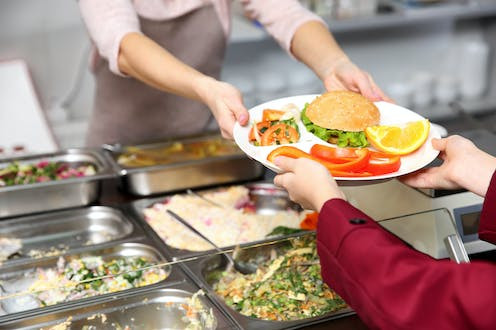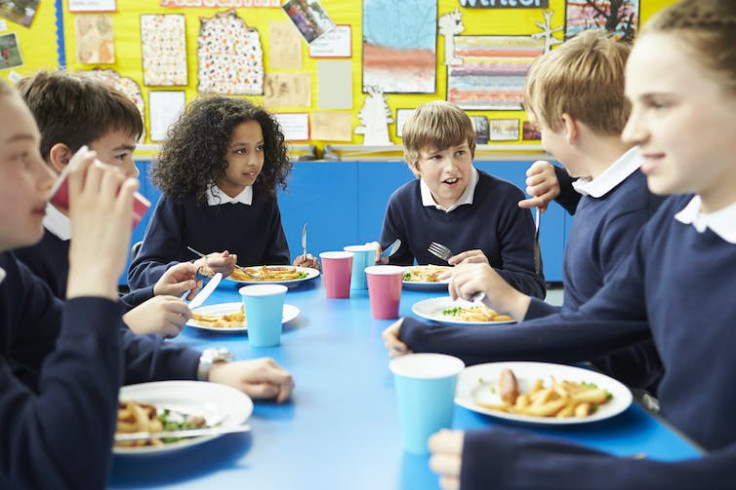Universal free school meals would make a huge difference to the cost-of-living crisis – here's how
Universal free school meals would put money back in the pockets of parents who are either currently purchasing school meals or preparing packed lunches.

The UK government's recent autumn statement set out several measures to help people with rapidly rising prices. These including increased benefit payments and an extension to the energy price cap, although at a less generous rate than currently guaranteed.
Campaigners will have been disappointed, though, at the lack of any announcement on another measure that could help many people with the cost of living crisis: an extension of entitlement to free school meals in England.
All children in reception, year one and year two in state schools in England are currently entitled to a free school meal at lunchtime on weekdays in term time. For children in year three and above in England, only those whose parents receive benefit payments are eligible. For those on universal credit, household earnings must be less than £7,400 per year. In the academic year 2021-22, 23% of schoolchildren at state schools were eligible for free school meals.
Extending free school meals to all primary and secondary school children with parents on universal credit would cost around £477 million a year. Providing them for all primary and secondary school children would require £1.8 billion a year. This is far less than the £100 billion estimated cost for the first year of the energy price guarantee.
There is support for extending free school meals among government ministers. Levelling up secretary Michael Gove confirmed his support for access to free school meals to children of parents on universal credit, also saying that "in an ideal world" all children in primary school would have free school meals. The absence of this policy from the autumn statement was arguably a missed opportunity.
Reaching families in need
Extended means-tested or universal free school meals would put money back in the pockets of parents who are either currently purchasing school meals or preparing packed lunches. It would save households of two parents and two children £37 per month on average.

Charity the Child Poverty Action Group has estimated that, under the current rules, 800,000 children are living in poverty who are not eligible for free school meals. This figure is likely to rise, both because living costs continue to increase and because the earnings threshold for free school meals has not risen with inflation. This means that working parents receiving pay rises may see their earnings increase above the threshold, even as the purchasing power of their salary decreases.
The threshold for free school meals means that a family with two children and earnings of £7,401 per year would not receive free school meals worth £900 per year – but they would if they earned a pound less. A "cliff edge" like this creates both hardship and a disincentive to increase household earnings.
Indeed this problem was part of why universal credit was created in the first place, as it is gradually reduced as earnings increase to avoid such a cliff edge. So the free school meals threshold undermines the effectiveness of universal credit.
Helping the NHS
What's more, a major stated objective of the autumn statement was to "protect vital public services". In practice this primarily meant increased spending on NHS care. However, extended means-tested or universal free school meals would also protect the NHS by helping to tackle tackling obesity.
My research with colleagues at the University of Essex has shown that the national universal infant free school meal scheme increased the proportion of children deemed a "healthy weight" and reduced schoolchildren's body mass index (BMI) throughout the reception year at school.
We have also found that when local authorities provide universal free school meals throughout primary school, both children in reception and year six have reduced obesity. The impacts are largest for children in year six who have received universal free school meals since they started primary school.
Research in Sweden has shown that children exposed to universal free school meals throughout primary school had higher educational attainment, better health, and earned 3% more over their lifetimes.
Obesity cost the NHS an estimated £6 billion in 2014-15. This is projected to rise to £9.7 billion by 2050. So tackling childhood obesity is vital.
Jeremy Hunt's autumn statement gave the intention to bring economic growth by "investing in the UK's people". Universal or even extended free school meals would have been just such an investment.
Angus Holford received funding for this work from the Nuffield Foundation (www.nuffieldfoundation.org) and from MiSoC, the ESRC-funded Research Centre on Micro Social Change (ES/S012486/1). The views expressed are Angus Holford's and not those of the Nuffield Foundation or the Economic and Social Research Council. This work uses data from the National Child Measurement Programme, supplied by NHS Digital. The use of NHS Digital statistical data in this work does not imply the endorsement or quality assurance of NHS Digital in relation to the interpretation or analysis of the statistical data. Angus Holford is a member of the Labour Party but is writing in a personal capacity.
























